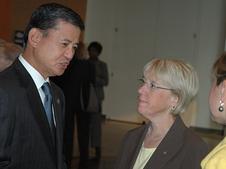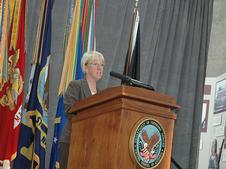|
|
|
|
VA Secretary Eric Shinseki, left, and Senator Murray speak at reception for
women veterans at Arlington National Cemetery |
|
(Washington D.C.)– Last night, U.S. Senator Patty Murray
(D-WA) spoke at a reception for women veterans at the Women’s Memorial in
Arlington National Cemetery. The reception, hosted by the Department of
Veterans Affairs (VA), preceded the VA’s “Forum on Women Veterans,” aimed at
engaging and educating veterans service organizations and women veteran
advocates about enhancements in VA services for women veterans. Also
speaking at the reception were VA Secretary Eric Shinseki, Senator Daniel Akaka
(D-HI), and Representative Bob Filner (D-CA).
“It’s
so important that we publicly recognize the sacrifices and contributions of our
women veterans,” Senator Murray said at the reception. “It’s up to
us to make sure they get the recognition they have earned. And it’s up to us to
guarantee they get the services and support they deserve. That’s why I
stand up and talk about this issue every opportunity I get.”
Murray’s
comprehensive
legislation to prepare the VA for the influx of women veterans who will
access care there in the coming years, the Women Veterans Health Care
Improvement Act of 2009, was signed
into law by President Obama on May 5, 2010.
Murray
also introduced
a bill that would expand assistance for homeless women veterans and
homeless veterans with children and increase funding and extend federal grant
programs to address the unique challenges faced by these veterans. This bill
was recently blocked
by Senate Republicans.
The
full text of Senator Murray’s remarks follows:
“Thank
you so much Marsha for that introduction.
“I
want to recognize Secretary Shinseki, as well Chairman Akaka and Chairman
Filner for their service and leadership.
“I
also want to thank everyone here from the VA and VSOs.
“You
all work so hard every day helping the men and women who deserve it most—and I
am truly grateful for everything you do. And I want to especially thank
the veterans here today for your sacrifices and your service.
“You
know, this is a very personal issue for me.
“Growing
up, I saw first-hand the many ways military service can affect veterans and
their families.
“My
father served in World War II and was among the first soldiers to land on Okinawa.
He came home as a disabled veteran and was awarded the Purple Heart.
“Like
many soldiers of his generation, my father didn’t talk about his experiences
during the war.
“In
fact—we only really learned about them by reading his journals after he passed
away.
“I
think that experience offers a larger lesson about veterans in general. They
are reluctant to call attention to their service, and they are reluctant to ask
for help.
“And
to tell you the truth, I think this is especially true for women veterans.
“That’s
why it is so important that we publicly recognize their sacrifices and
contributions.
“It’s
up to us to make sure they get the recognition they have earned. And it’s up to
us to guarantee they get the services and support they deserve.
“That’s
why I stand up and talk about this issue every opportunity I get. And it’s why
I introduced my bill, the Women Veterans Health Care Improvement Act of 2009.
“This
legislation expands and improves health care services to women veterans. It makes
sure the VA has the resources to handle the long?term needs associated with a larger
women veteran population. And I was proud to stand next to President Obama back
in May when he signed this bill into law.
“I
was also pleased to introduce the Homeless Women Veterans and Homeless Veterans
with Children Act of 2009, which would make sure female homeless veterans have
the opportunity they deserve to move their families into stable housing.
And I am going to keep fighting to pass this critical bill that so many
veterans with families desperately need.
“You
know, my work on women veterans issues began many years ago. I had been holding
meetings with veterans throughout Washington state where I would sit down with
them to listen to their stories about the difficulties they were facing
transitioning home.
“I
would hear from some of the male veterans about their difficulties dealing with
PTSD.
“I
would hear from families about the struggles of caring for a loved one with a
Traumatic Brain Injury. And from veterans who were waiting far too long for the
benefits they rightly felt they had earned.
“But
as these meetings ended and the crowds began to break up—almost every time—one
of the female veterans who had attended would come up to me and whisper in my ear.
“She
would tell me about the difficulties she faced coming home from service.
“Whether
it was MST, or being thrust into a care-giving role, or just an inability to
find a fellow women veteran to talk to, these women veterans all believed more could
be done to help.
“So
I took up their cause—and I promised them I wouldn’t stop fighting for the
changes they needed.
“Because
this effort is about having a system that is sensitive to their needs. Where
they can access the private, specialized care they deserve.
“It’s
about ensuring that if something does go wrong for women veterans—the system is
equipped to deal with it. And it’s about making sure that women veterans
know they don’t don’t have to whisper their problems anymore—they can stand up
and talk about them with everyone else.
“So
thank you again for inviting me here today. And for everything you all do for
our veterans, our families, and our nation.
“You
all do such great work fighting to help women veterans across the country—and I
am never going to stop fighting by your side. Enjoy the rest of the
night.”




